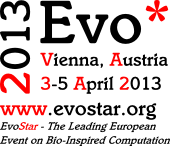Bio-inspired algorithms for continuous parameter optimisation
“The main application areas of EC techniques [in industry] are multi-objective optimization, classification, data mining and numerical optimization”. [1]
Many engineering problems of both theoretical and practical interest involve choosing the best configuration of a set of parameters to achieve a specified objective. Numerical optimisation refers to the case when these parameters take continuous real values, as opposed to combinatorial optimisation, which deals with discrete values. Examples include designing production processes for maximum efficiency, optimal parameter adjustment for controllers and many others. EvoNUM focuses on such problems.
We seek high quality papers involving the application of bio-inspired algorithms (genetic algorithms, genetic programming, evolution strategies, differential evolution, particle swarm optimization, evolutionary programming, simulated annealing… and their hybrids) to continuous optimisation problems in engineering. We also welcome cross-fertilisation between Nature-inspired algorithms and more classical numerical optimisation algorithms.
[1] GS Hornby & T Yu, “EC Practitioners: Results of the First Survey”, SIGEVOlution, Newsletter of the ACM Special Interest Group on Genetic and Evolutionary Computation, Vol. 2(1), Spring 2007 www.sigevolution.org
Areas of Interest and Contributions
EvoNUM deals with engineering applications where continuous parameters or functions have to be optimised, in fields such as control, chemistry, agriculture, electricity, building and construction, energy, aerospace engineering, design optimisation, etc.
EvoNUM aims to cover areas that include but are not limited to:
- Local learning of parameters
- Mechanisms to incorporate constraints
- Theoretical developments
- Performance measures and performance analysis
- Benchmark problems
Publication Details
Accepted papers will appear in the proceedings of EvoStar, published in a volume of the Springer Lecture Notes in Computer Science, which will be available at the Conference.
Submission Details
Submissions must be original and not published elsewhere. They will be peer reviewed by members of the program committee. The reviewing process will be double-blind, so please omit information about the authors in the submitted paper.
Submit your manuscript in Springer LNCS format.
Page limit: 10 pages to http://myreview.csregistry.org/evoapps13/.
Submission deadline: 1 November 2012 Extended to 11 November 2012
EvoNUM track chairs
- Anna I Esparcia-Alcázar
S2 Grupo, Spain
aesparcia(at)s2grupo.es
- Anikó Ekárt
Aston University, UK
a.ekart(at)aston.ac.uk






